Cezve

A cezve is a pot designed specifically to make Turkish coffee. The body and handle are traditionally made of brass or copper, occasionally also silver or gold. Though, recently, cezveler are also made from stainless steel, aluminium, or ceramics. The long handle is particularly useful to avoid burning one's hands, and the brim is designed to serve the coffee.
Name
The name cezve is of Turkish origin, where it is a borrowing from Arabic: جذوة .
Other regional variations of the word cezve are jezve and čezve. In Ukrainian and Russian, the word is spelled джезва (where it exists alongside турка, IPA: [ˈturkə]). In Bosnia and Herzegovina, Serbia, Montenegro, Croatia, Slovenia, Slovakia and Czech Republic it is a long-necked coffee pot, spelled džezva.
Other names
- In Greece, the device is called briki (μπρίκι), a borrowed word from the Ottoman Turks. The Greek name is also used in English-speaking countries[citation needed] such as the United States and Australia because of their large Greek diasporic populations.
- In Macedonia, it is known as ѓезве (ǵezve).
- In Armenian, the brewer is called jazva (Ջազվա).
- Croatian: džezva
- In Bulgarian джезве dʑɛzvɛ.
- Cypriot Greek τζιζβές (IPA: [dz̺ɛzvɛ]) or τζουζβές IPA: [dz̺uzvɛ]
- In Israel the vessel is commonly known as a Hebrew: פינג'אן (IPA: [findʑan]), a name derived from the Arabic term for a small serving cup.
- In Kosovo: Gheg Albanian: xhezve; coffee made in this manner is very popular there.
- Levantine Arabic: rakwa[1][2]
- Tunisian Arabic Zezwa
- Egyptian Arabic kanaka
- Palestinian Arabic ghallāye
- Russian: турка IPA: [turkə].
- Romanian: ibric.
- In the rest of the world, the cezve is known as an ibrik, which is also its most common name in the United States, just like in Romania. Ibrik is a Turkish word from Arabic ʿibrīq, in turn a rendition of Middle Persian ābrīz from āb "water" and riz "cup".[3] In Turkey, ibrik has another meaning; it is used for long spouts but for handling liquids like oil and wine, not brewing coffee.
Gallery
-
Copper cezve with Turkish coffee pouring out.
-
Utensils to prepare Turkish coffee (handmade from Crete). A cezve is at the bottom.
See also
- Dallah (Arabic coffee pot)
- Jebena (Ethiopian coffee pot)
- Arabic coffee
- Turkish coffee
References
- ^ Shadid, Anthony (2012). House of Stone: A Memoir of Home, Family, and a Lost Middle East. Houghton Mifflin Harcourt. ISBN 0-547-13466-5.
{{cite book}}: Invalid|ref=harv(help), page 24. - ^ see also Hans Wehr Dictionary of Modern Written Arabic --- rakwa page 416.
- ^ Steingass, Francis Joseph (1992). A Comprehensive Persian-English Dictionary: Including the Arabic Words and Phrases to be Met with in Persian Literature, Being, Johnson and Richardson's Persian, Arabic, and English Dictionary, Revised, Enlarged, and Entirely Reconstructed. Asian Educational Services. ISBN 978-81-206-0670-8.
{{cite book}}: Invalid|ref=harv(help) page 8.


